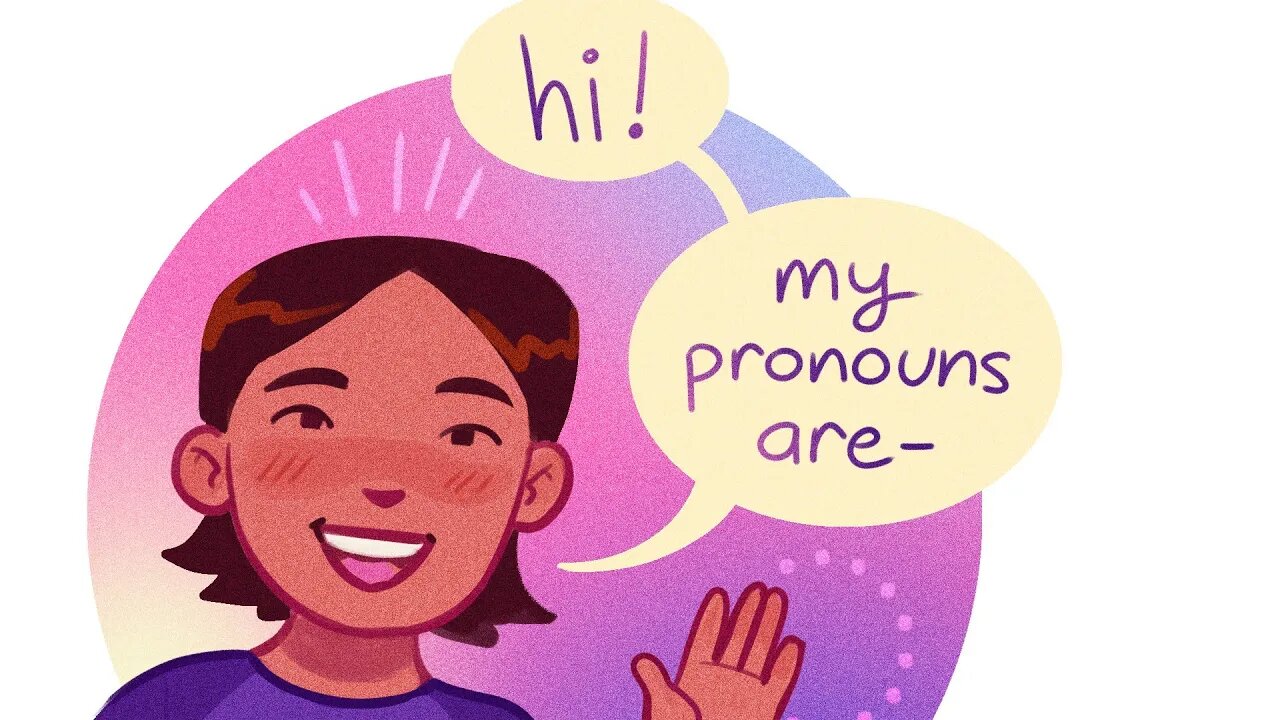Premium Only Content

Personal Pronouns Now at My Workplace
In the internal quest of being ever more inclusive, the university that I work for recently sent us all an email stating, “Dear Colleagues, Sharing your pronouns signals respect and safety for all genders and gender expressions. All staff are now invited to include their personal pronouns on their Staff Profile and in their email signature. Kind regards, Sam Jones (He/They), Senior Adviser | Gender Inclusion and Equity”. First of all, I’m not sure what Sam means by ‘He/They’, but we’ll get to that soon.
DISCLAIMER: I’m all for individuals thinking and doing what they like, as long as they do it voluntarily, and as long as they don’t harm anybody in the process.
So I headed over to my staff profile, and as promised, I can update my personal pronouns. Now obviously, the reason the university are doing this is to be inclusive of everyone’s gender identity. However, without delving any deeper, I can immediately tell you that they’ve already failed. If you look at this list (which is the exhaustive list, mind you), you can immediately see that the university are restricting what people can be identified as. They’ve defined the full set of inclusive pronouns as he, she, and they, basically. There are no other options. Now they’re the ones claiming they’re being inclusive, but if you just do a preliminary search online, you can see that there are so many more. Did yo enjoy yoself? The New York Times published an article last year titled “A Guide to Neopronouns”. Things like, bunself, kittenself, vampself, princesself, faeself, and Innitself. Did kitten enjoy kittenself?
Okay, whatever. I’m not here to mock. But the university are claiming that they are being inclusive of everyone’s gender identity, but yet, they refuse to acknowledge people who identify as bunnies and kittens. Now is that being respectful of everyone, I mean, with regards to the complex and murky world of gender politics? Perhaps some gender fluid people think calling somebody Innit or vamp is just ridiculous/confusing, but then surely they would also understand that some people might find it equally confusing calling somebody She/They.
Here’s an article talking about He/They from last year. “What does it mean if a person uses the pronouns "he/they" or "she/they"? That means that the person uses both pronouns, and you can alternate between those when referring to them. So either pronoun would be fine — and ideally mix it up, use both”. But then another person says, “For some people, they don't mind those pronouns being interchanged for them. And for some people, they are using one specific pronoun in one context and another set of pronouns in another, dependent on maybe safety or comfortability. The best approach is to listen to how people refer to themselves”.
Another article titled, “Why some people use she/they & he/they pronouns”, by LGBTQ Nation, refers to these pronouns as “rolling pronouns”. They also state that, “Rolling pronouns can be rotated or alternated within the same sentence, from one sentence to another, or from conversation to conversation”. But ultimately, “It depends on the person. Some people prefer to have their pronouns used alternately throughout a conversation or a text. For example, “He’s coming to the party. They just got caught up at work.” But others may prefer one pronoun set over another on different days. This is particularly true for genderfluid folks, who fluctuate from one gender identity to another. The bottom line? Just ask”.
In an article by M. J. Murphy, Professor of Gender & Sexuality Studies at the University of Illinois Springfield, titled, “No, You Can’t Have My Pronouns! Asking for gender pronouns isn’t always progressive”. Professor Murphy is an openly gay man, but he has found that “asking for people’s pronouns” is a form of coercion and has gone too far. He states, “Despite being promoted as a gesture of support and inclusion, Levin described several examples where the practice of asking a person’s pronouns had a contrary effect. It can force transgender students to choose between lying or publicly disclosing their transgender status to a roomful of strangers on the first day of a class. Also, such requests can imply to a transgender person that they’re not successfully presenting their gender in a way that’s consistent with their gender identity. Others have written how providing gender pronouns in professional settings highlight a person’s gender, often to the detriment of women. These examples show how even well-intended gestures of inclusion can have unintended harmful consequences”.
Anyway, thanks to Professor Murphy’s article, I’m going to respectfully tell my university that no, they cannot have my pronouns. I’m not going to play they’re stupid, coercive game. Instead, I’m simply going to be respectful, kind, and helpful to all people I come in contact with on a daily basis, regardless. Isn’t that what we should all be doing?
MUSIC
Melancholia by Godmode
-
 6:36
6:36
Daily Insight
3 months agoConflicting Unborn Child Laws in Australia
1672 -
 8:00:07
8:00:07
SpartakusLIVE
11 hours agoDuos w/ Woes || Friday Night HYPE
36.8K -
 8:05:10
8:05:10
CHiLi XDD
9 hours agoPart 2 F Em UP Friday!
41.5K3 -
 5:14:28
5:14:28
FreshandFit
8 hours agoCall-In Show
64.8K21 -
 3:00:07
3:00:07
JustPearlyThings
9 hours agoWhy Do Modern Women Think Disrespecting Their Husbands Publicly Is Funny? Call-In Show | Pearl Daily
71.5K25 -
 1:35:17
1:35:17
Badlands Media
1 day agoEye of the Storm Ep. 241
87.6K34 -
 2:05:58
2:05:58
TimcastIRL
9 hours agoTrump Just REVOKED Legal Status Of 530,000 Migrants, Deportations NOW w/ Alex Stein | Timcast IRL
191K284 -
 3:39:01
3:39:01
I_Came_With_Fire_Podcast
13 hours agoCHINA MILITARY PURGE | TESLA OWNERS DOXXED | NGAD F-47
43.2K15 -
 5:44:43
5:44:43
Shield_PR_Gaming
14 hours agoSome Gray Zone Warfare with Followers & more games!
65K3 -
 31:38
31:38
Michael Franzese
10 hours agoTony Accardo: The Genius That Built Chicago’s Most Powerful Empire
66.6K3